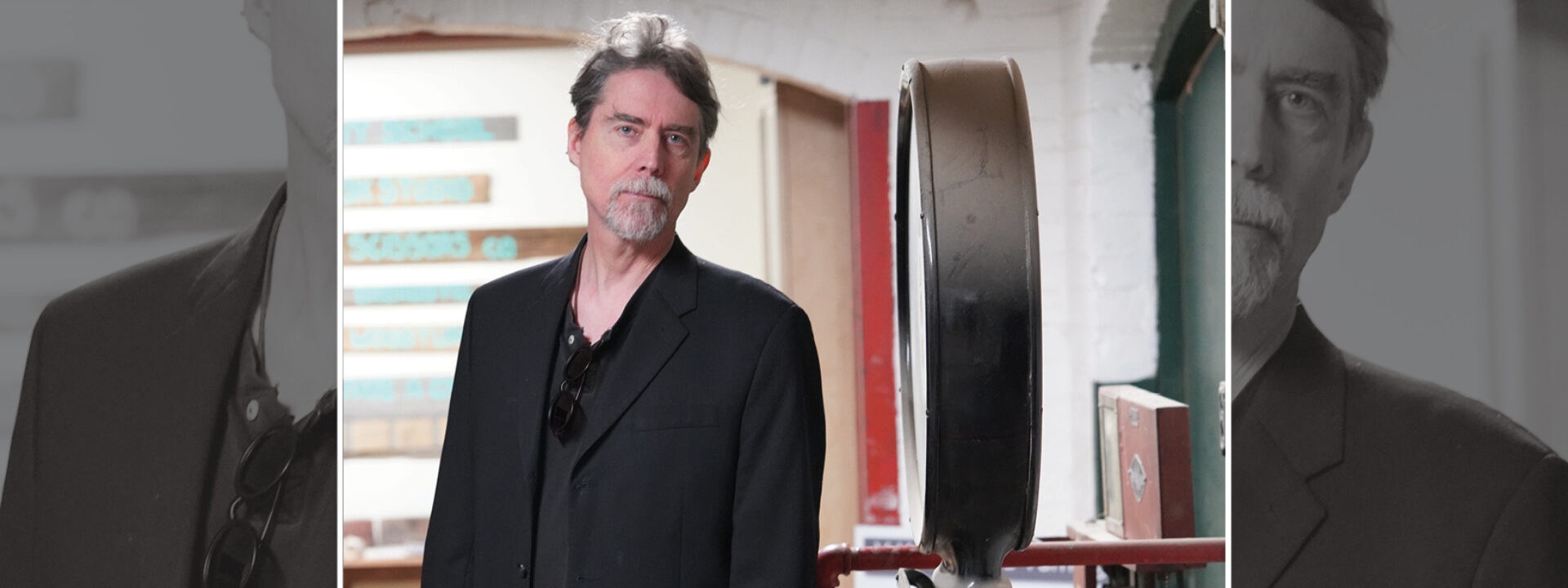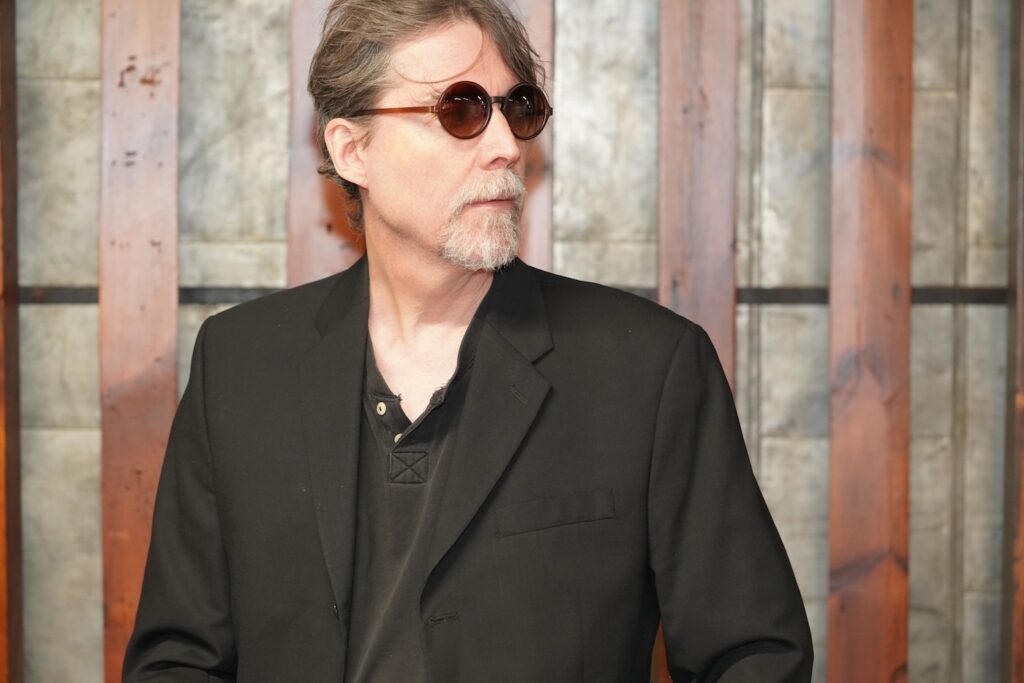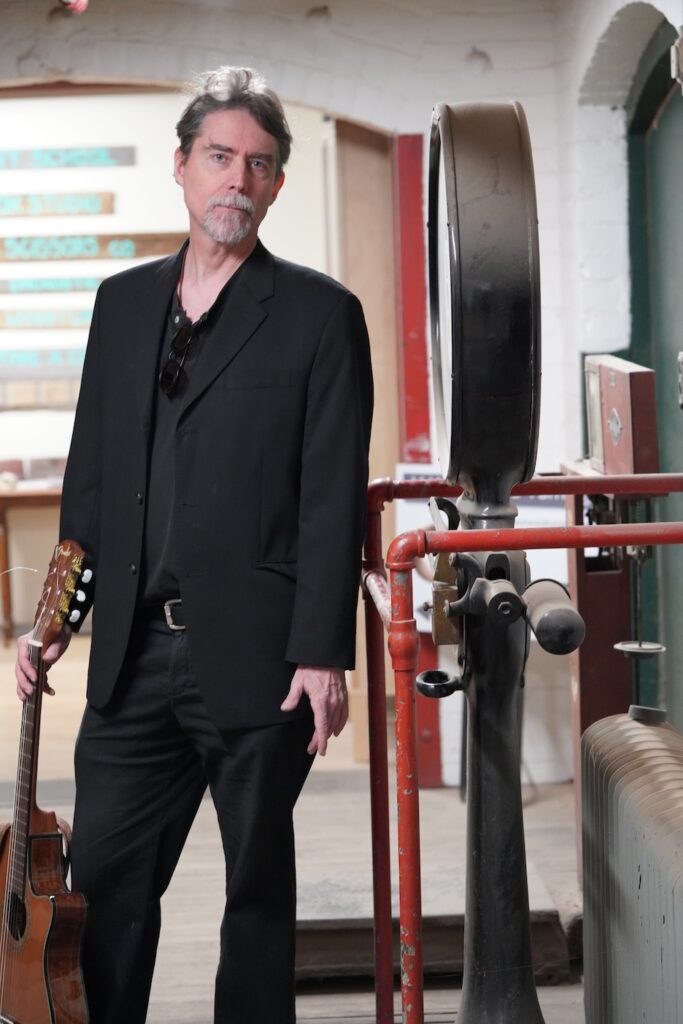At the top of his game

Veteran Hamilton singer-songwriter Philip “Pip’ Kummel releases his ‘magnum opus,’ with 30th album Every City.
Releasing 30 albums is a momentous milestone for any artist. Seasoned Hamilton singer/songwriter Philip ‘Pip’ Kummel has achieved that impressive feat with his brand new record, Every City, and it is made sweeter by his confidence that he is at the top of his game.
Chatting with HAMILTON CITY Magazine, Kummel (who records as Pip) calls Every City “my magnum opus, my Sgt. Pepper’s. I believe I have reached my potential as a musician, songwriter, and performer and that this is my best work.”

Kummel has patiently honed his craft over five decades of work, first in such rock and punk-accented bands as Varsol and A Room with a View in the fertile early ’80s Toronto scene, and then, with the Philip Kummel Band and as a solo artist, diligently developing his own broader style, unswayed by any prevailing trends of the day.
The “Pip sound” is an eclectic one, drawing upon strains of folk, jazz, rock and bossa nova, and showcasing melodic guitar work and poetic lyrics. Assisting his cause on the self-produced 16-song Every City is the skillful accompaniment of an elite grouping of Hamilton musicians, including Dan Fortin (Myriad3), Kevin Christoff (Simply Saucer), David Lee, Jay Burr, Will Gillespie, Karen Thornton, Aaron Hutchison (Haolin Munk), and more.
Their support reminds Kummel that the vibrant Hamilton music community is the right place for him. A nomadic troubadour, he has lived and made music in Toronto, Peterborough, Vancouver, Paris, Prague, Germany, Hamburg, South Korea, Bangkok, Laos, and other locales prior to settling here.He explains that the title of Every City “is a reference to all the different places I’ve played and written in, been influenced by, the languages I’ve spoken, and the musicians I’ve met. I moved to Hamilton in 2008 because it’s a real city. It has everything that comes with that, yet it has a smaller village feel. You can meet the mayor, and I have. I’m still doing what I love to do, and this is a good city to do it in.”

Q&A: Magic in the music
HCM: Is it correct that your new album, Every City, is your 30th?
Pip Kummel: Yes, this is officially No. 30, and that doesn’t count all those bands who I wrote songs for. It was not until 1992 that I started registering my songs with SOCAN. Now I have over 400 songs with them. I think they keep getting better.
You have a great guest list of local musical notables on Every City.
PK: I’m so glad that almost everybody I called agreed. Some, like Aaron Hutchison, a Polaris Prize-winning producer, didn’t know me. They all engaged. They took it very seriously. Clearly they saw merit in the work. I have something of a reputation. We were counting people who have their own mature voice, uncontaminated by conventional pop music or by record people, like Martin Verrall, Edgar Breau, Bob Bryden, and myself. Hamilton always talks about its music scene in terms of rock bands, electronica, but there is also a little known coterie of singer/songwriters, even though I hate that phrase. People who don’t sound like anyone else.
You call the album your "magnum opus." Is that because of the guest players?
PK: No. In the past I’ve had lots of support players too. It is because I felt like in the last 10 albums I have found my voice, one that is only mine. So I have transcended any influences. This one is that, but writ large. There are 16 tracks, so it is really substantial. Plus all these players are really stellar and they came through for me in spades.
So that was enjoyable. Making records is always a pain in the ass but this was enjoyable to have these people on board. For the last few albums I have felt this is me at my peak so you have to enjoy it and not judge it. With the new record, it has all come together and I have reached my potential as a musician, a songwriter, a composer and a performer. I’m still performing. I played Festival of Friends last year, and some of the clubs.
It does feel like I’m not going to do any better than this. I’ve been lucky enough to get to this point in my career. I am 63 years old, I’m still doing it, and I’m at my peak. I think that is pretty rare. So I’m lucky I managed to survive all my day jobs in all the different countries I lived in and came back to Canada and put out a string of albums that have helped me reach that potential. I’m never going to be a cultural phenomenon. I don’t look pretty enough to be the next rising star. I set myself that challenge of appreciating my own work. Not as an egotist, but just living in the moment, believing this is it. This is my best work. That is why I referenced this as my Sgt. Pepper. I may still do a Magical Mystery Tour EP!
Was there a mandate with this record?
PK: Part of my challenge with this record was to write some songs that are uplifting and make you
feel good on the inside while still being substantial musically and I think I reached that goal. I’m
not saying that to brag. Other people feel that way, too. So there are 16 songs here. This will make you feel good or your money back! I was very happy to have everybody contribute on such a high level, and with engagement. The human element shines through in this record.
Why am I still making music? Because it is magic. You don’t know quite know why it works. I find that intriguing. It can uplift you.
I’m curious on the production side. Was it self-produced at your home studio?
PK: It is quite lo-fi, but it doesn’t sound that way. I’ve made a lot of records so you take the equipment you have, use your ears and make it work. So I made it at home, with a couple of good microphones. There are drums on five songs, and the drummer did them in his studio as I’m not set up for that. I had a few guests drop by my studio. At the time, my nephew-in-law had moved in with me and was living in the studio, so there was a scheduling challenge.
It took a long time to finish the record, but I knew that would be the case and I didn’t pressure myself. I had the goal of the end of 2023, and that is exactly when it was done. Technically, it won’t sound like Grant Avenue, but I feel it sounds pretty good. The production is quite organic. It doesn’t have a lot of programming. It comes nicely together as an organic sound, I feel. It is not slick, but it has legs. There is humanity in this record, and that was one of my goals.
Was it live off the floor?
PK: Each song is different but with a lot of them I put down the guitar tracks – some have a click track – and a lot of the bass is me, even though I have three guest bassists. Quite a few musicians sent back their parts, after recording it themselves. For instance, I still haven’t met Aaron Hutchison. I asked him to play trumpet on one song, "Coconut Pearl," the lead-off track. A month later, he sent me 17 tracks. It turned out really well.
Do you play acoustic and electric guitar here?
PK: It depends on the song. I have two guest electric players here. One is my son, Per Garside, who plays on the left channel of "Everybody’s Saying’" and I play the right channel. It is the second song. And on "Volunteer," that is Michael Blais from Minimum and many other bands. It is my lead on the song that Karen Thornton sings on. She is a national level jazz singer and promoter. She recently sang with Laila Biali and Heather Bambrick. The jazz scene here is pretty good. One regret I have is that I had a big concert planned in 2020 for my 60th, and we all know what
happened then. I had Mills Hardware booked and a stellar lineup set.
I hear some jazz elements in your work. Did you study that at all?
PK: I did study music, but not jazz. When I was really young I was in an Orff group. I studied piano and guitar there, and voice. I worked at the Royal Conservatory for two years and cashed in on all their courses. I also used their studios.
What are the plans for the release of Every City?
PK: We are considering an album release listening party, at the house of a musician friend. By invitation. I’m not thinking performance there. And possibly a public listening party somewhere like the Casbah Lounge.
Can we talk about your musical past? I gather you were part of the late '70s and early
‘80s Queen Street West scene in Toronto?
PK: Yes, I was part of the Cameron House scene then. A girlfriend at the time, Rae Johnson, was a mover and shaker in the visual arts, part of ChromaZone and an activist who used to live at The Cameron. All those people were acquaintances of mine, through Rae. Musicians and visual artists congregated. It was just more of an open mindset then.
Would you perform?
PK: I was more of a band guy then. Some really obscure bands in the '70s and '80s. The name Varsol rings a bell
It was famous for 15 minutes along the strip. We played the Cameron, 100 Bond Club, The Beverley. Then there was another band that was kind of like The Clash, but more pop. We played all those rooms, plus the Cabana Room, Hotel Isabella. So I had a slew of bands and I did some theatre on Queen Street. I was in the punk scene but not really of it. I was writing stuff for the punk bands, but I grew out of that. I have been writing ever since.
And then you moved to Peterborough for a spell?
PK: Yes. I dried out, and formed a new band with a jazz drummer and a tasteful bass player. We made one record as a trio, then the played on a few songs on my next few records. The one as a trio is called Corridor, and it’s on Bandcamp. It is still getting some airplay. We recorded in a jingles studio there. On the Peterborough scene, there was Willie P. Bennett, Beau Dixon, myself, and Dave Tough, a luminary at the time there.
Then it was back to Toronto and onto Asia and Europe?
PK: I left Peterborough around 2000 and moved back to Toronto. Worked at The Royal Conservatory for about two years. My cohort at the front desk invited me to come when she moved back to Seoul, Korea. We left, and there I put together a five-piece band. We travelled up and down the Korean coast, making shitloads of money as it was the year of co-hosting the World Cup of soccer. They were throwing money around like crazy. I never made that much
money in my life! The band was top-notch. I insisted on half originals and half covers, '60s vocal jazz, an era I
knew. It was good to stretch that way. We made some recordings including a bossa nova that appeared on the album Ennuii Café. I moved to Germany from there. Got myself connected. Some theatre artists put me up. I was
there six months, trying to get a leg up. Played a few dodgy places in Hamburg. Then I lived a few years in Thailand, taught English and met my wife there. We moved to Laos, stayed there a few years, then in 2008 I sponsored her to move to Canada. It took a year to bring her here, and we’re still together.
I chose Hamilton because my Toronto isn’t there anymore. My Peterborough and Vancouver aren’t there anymore. I love Montreal, but my wife doesn’t speak French, so I wasn’t going to do that to her. My mother lives in Stoney Creek, and she’s 94. I wanted to live in a city in Canada, and Hamilton seemed my best choice. Winnipeg is too cold!
I had been to Hamilton a few times. Played Festival of Friends, visited my parents. This is a real city. It reminds me of Vancouver in 1982. A real city, but has a smaller village feel. You can meet the mayor and your city councillor, and I have. Everybody knows everybody. I came in with a certain credibility as a musician. I may not have hit the big time, but I’m still doing what I love to do. This is a good city to do it in. When I go back to Toronto and I feel lost.
Any final thoughts?
PK: One thing I wanted to get out there to your readers: If you pretend to support local music, you need a CD player. Go buy a cheap gadget. The only carrier able to us low-budget independent artists is the CD. Streaming doesn’t help me and I can’t afford vinyl. I don’t have any backing, any grants, or a sugar-daddy.
Philip Kummel’s album Every City is available on Bandcamp here.












